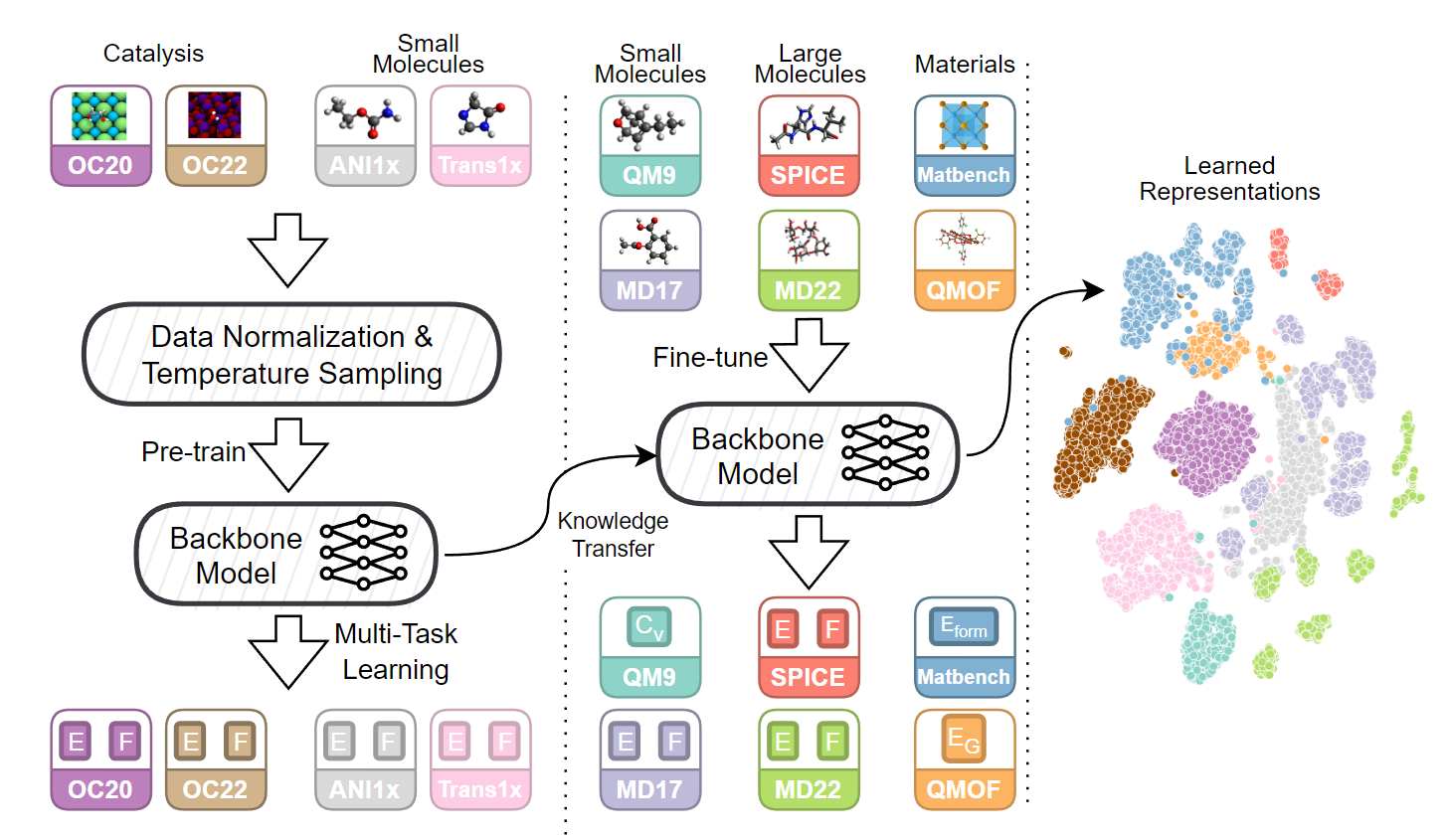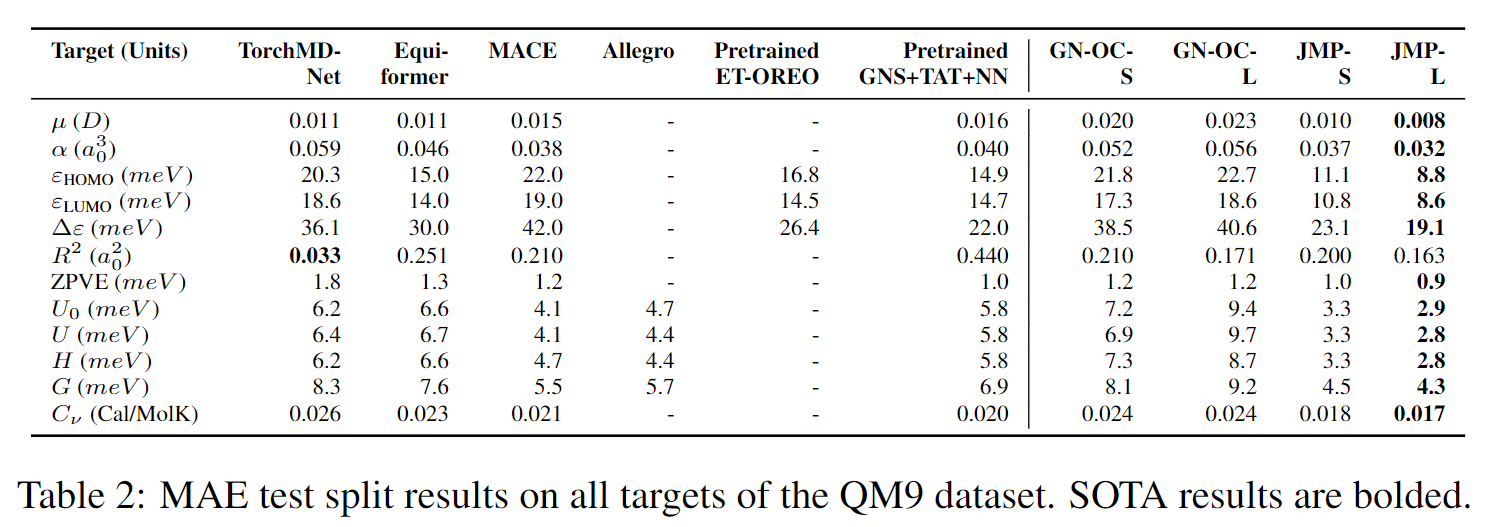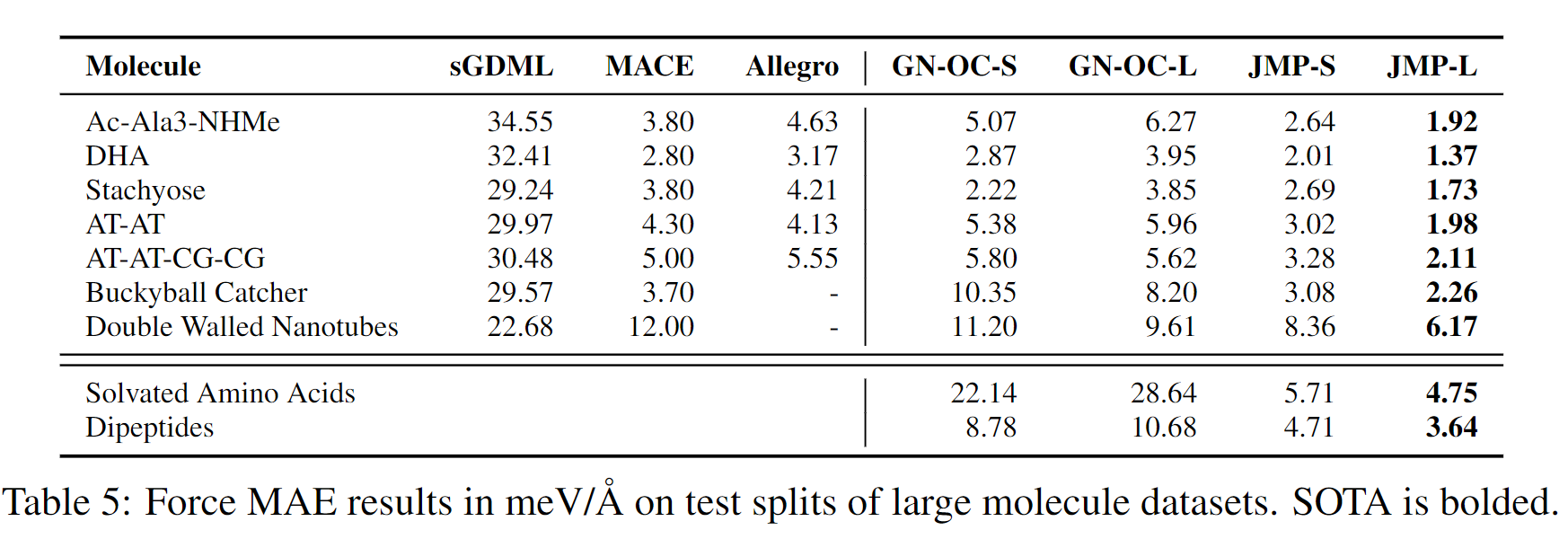Please see our website for more information about this work.
This repository contains the code for the paper "From Molecules to Materials: Pre-training Large Generalizable Models for Atomic Property Prediction".
This repository is deprecated and is no longer actively maintained. We are currently working on integrating the functionality of this repository into the official Open Catalyst Project repository. If you have any questions or concerns with respect to this repository, please feel free to create a github issue or reach out to us via email. Please send an email to Nima Shoghi and CC Brandon Wood.
In this work, we introduce Joint Multi-domain Pre-training (JMP), a supervised pre-training strategy that simultaneously trains on multiple datasets from different chemical domains, treating each dataset as a unique pre-training task within a multi-task framework. Our combined training dataset consists of ~120M systems from OC20, OC22, ANI-1x, and Transition-1x.
The key contributions of this work are:
-
We demonstrate JMP's powerful generalization ability by evaluating its fine-tuning performance across a diverse benchmark suite spanning small molecules, large molecules, and materials. JMP consistently outperforms training from scratch and sets or matches the state-of-the-art on 34 out of 40 fine-tuning benchmarks.
-
We show that JMP enables efficient scaling to larger models that would normally overfit if trained from scratch on small datasets. Pre-training acts as a strong regularizer, allowing us to train a model with 235M parameters that sets new state-of-the-art performance on multiple low-data benchmarks.
-
We conduct a detailed analysis of JMP's computational requirements. While expensive upfront, we show JMP's pre-training cost is recovered by enabling over 12x faster fine-tuning compared to training from scratch.
By pre-training large models on diverse chemical data, we believe JMP represents an important step towards the goal of a universal ML potential for chemistry. The continued growth of available data and compute power will only improve JMP's ability to learn transferable atomic representations.
JMP demonstrates an average improvement of 59% over training from scratch, and matches or sets state-of-the-art on 34 out of 40 tasks. Our work highlights the potential of pre-training strategies that utilize diverse data to advance property prediction across chemical domains, especially for low-data tasks.
First, clone the repository and navigate to the root directory:
git clone https://github.com/facebookresearch/JMP.git
cd JMPThen, set up the conda environment, as provided in the environment.yml file. To do so, run the following command (NOTE: replace conda with mamba if you have it installed):
conda env create -f environment.yml -n jmpIf the above command fails, you can create the environment manually yourself:
# Create the environment
conda create -n jmp python=3.11
conda activate jmp
# Install PyTorch
conda install -y -c pytorch -c nvidia pytorch torchvision torchaudio pytorch-cuda=12.1
# Install PyG, PyTorch Scatter, PyTorch Sparse.
conda install -c pyg pyg pytorch-sparse pytorch-cluster
# Install other conda dependencies
conda install -y \
-c conda-forge \
numpy matplotlib seaborn sympy pandas numba scikit-learn plotly nbformat ipykernel ipywidgets tqdm pyyaml networkx \
pytorch-lightning torchmetrics lightning \
einops wandb \
cloudpickle \
"pydantic>2" \
frozendict wrapt varname typing-extensions lovely-tensors lovely-numpy requests pytest nbval
# Install pip dependencies
pip install lmdb
# Install dependencies for materials datasets
pip install ase
# Install dependencies for large molecule datasets
conda install h5py
# Install MatBench dependencies
pip install matbench
# Install dependencies for PDBBind
pip install biopython rdkit
# Install dependencies for pre-processing ANI1x/Transition1x
pip install multiprocessThen, activate the environment:
conda activate jmpFinally, install the current package as follows:
pip install -e .The code is now ready to be used. See the configuration files in the configs directory for examples on how to run the code.
The data used for pre-training and fine-tuning is not included in this repository due to size constraints. However, instructions for downloading and preprocessing the OC20, OC22, ANI-1x, Transition-1x, QM9, rMD17, MatBench, QMOF, SPICE, and MD22 datasets are provided below.
- For OC20 and OC22, please refer to the Open Catalyst Project dataset instructions.
- For ANI-1x, refer to the "ANI-1x Dataset" section below.
- For Transition-1x, refer to the "Transition-1x Dataset" section below.
To download the ANI-1x dataset and convert it to a format that can be used by our codebase, please follow these steps:
- Create a directory to store the ANI-1x dataset and navigate to it:
mkdir -p /path/to/datasets/ani1x
cd /path/to/datasets/ani1x- Download the ANI-1x dataset (in
.h5format) from the official source:
wget https://springernature.figshare.com/ndownloader/files/18112775 -O ani1x-release.h5- Compute the train, validation, and test splits:
python -m jmp.datasets.scripts.ani1x_preprocess.ani1x_splits --input_file ani1x-release.h5 --train_keys_output train_keys.pkl --val_keys_output val_keys.pkl --test_keys_output test_keys.pkl- Convert the h5 file to a set of
.trajfiles (set--num_workersto the number of CPU cores you have available):
mkdir -p traj
mkdir -p traj/train traj/val traj/test
python -m jmp.datasets.scripts.ani1x_preprocess.ani1x_write_traj --ani1x_h5 ani1x-release.h5 --split_keys train_keys.pkl --split train --traj_dir traj/train --num_workers 32
python -m jmp.datasets.scripts.ani1x_preprocess.ani1x_write_traj --ani1x_h5 ani1x-release.h5 --split_keys val_keys.pkl --split val --traj_dir traj/val --num_workers 32
python -m jmp.datasets.scripts.ani1x_preprocess.ani1x_write_traj --ani1x_h5 ani1x-release.h5 --split_keys test_keys.pkl --split test --traj_dir traj/test --num_workers 32- Convert the
.trajfiles to.lmdbfiles:
mkdir -p lmdb
mkdir -p lmdb/train lmdb/val lmdb/test
python -m jmp.datasets.scripts.ani1x_preprocess.ani1x_write_lmdbs --data_path traj/train --out_path lmdb/train --split train --num_workers 32
python -m jmp.datasets.scripts.ani1x_preprocess.ani1x_write_lmdbs --data_path traj/val --out_path lmdb/val --split val --num_workers 32
python -m jmp.datasets.scripts.ani1x_preprocess.ani1x_write_lmdbs --data_path traj/test --out_path lmdb/test --split test --num_workers 32- Compute the linear reference energies:
python -m jmp.datasets.scripts.ani1x_preprocess.ani1x_linear_ref linref --src lmdb/train --out_path linref.npz- Compute the mean/std of the energies:
python -m jmp.datasets.scripts.ani1x_preprocess.ani1x_linear_ref compute_mean_std --src lmdb/train --linref_path linref.npz --out_path mean_std.pklTo download the Transition-1x dataset and convert it to a format that can be used by our codebase, please follow these steps:
- Create a directory to store the Transition-1x dataset and navigate to it:
mkdir -p /path/to/datasets/transition1x
cd /path/to/datasets/transition1x- Download the Transition-1x dataset (in
.h5format) from the official source:
wget https://figshare.com/ndownloader/files/36035789 -O transition1x-release.h5- Convert the h5 file to a set of
.trajfiles (set--num_workersto the number of CPU cores you have available):
mkdir -p traj
mkdir -p traj/train traj/val traj/test
python -m jmp.datasets.scripts.transition1x_preprocess.trans1x_write_traj --transition1x_h5 transition1x-release.h5 --split train --traj_dir traj/train --num_workers 32
python -m jmp.datasets.scripts.transition1x_preprocess.trans1x_write_traj --transition1x_h5 transition1x-release.h5 --split val --traj_dir traj/val --num_workers 32
python -m jmp.datasets.scripts.transition1x_preprocess.trans1x_write_traj --transition1x_h5 transition1x-release.h5 --split test --traj_dir traj/test --num_workers 32- Convert the
.trajfiles to.lmdbfiles:
mkdir -p lmdb
mkdir -p lmdb/train lmdb/val lmdb/test
python -m jmp.datasets.scripts.transition1x_preprocess.trans1x_write_lmdbs --data_path traj/train --out_path lmdb/train --split train --num_workers 32
python -m jmp.datasets.scripts.transition1x_preprocess.trans1x_write_lmdbs --data_path traj/val --out_path lmdb/val --split val --num_workers 32
python -m jmp.datasets.scripts.transition1x_preprocess.trans1x_write_lmdbs --data_path traj/test --out_path lmdb/test --split test --num_workers 32- Compute the linear reference energies:
python -m jmp.datasets.scripts.transition1x_preprocess.trans1x_linear_ref linref --src lmdb/train --out_path linref.npz- Compute the mean/std of the energies:
python -m jmp.datasets.scripts.transition1x_preprocess.trans1x_linear_ref compute_mean_std --src lmdb/train --linref_path linref.npz --out_path mean_std.pkl- For rMD17, please run the following command to download the dataset to your desired directory:
python -m jmp.datasets.finetune.rmd17 download --destination /path/to/datasets/rmd17/ - For QM9, please run the following command to download the dataset to your desired directory:
python -m jmp.datasets.finetune.qm9 download --destination /path/to/datasets/qm9/ - For MD22, please run the following command to download the dataset to your desired directory:
python -m jmp.datasets.finetune.md22 download --destination /path/to/datasets/md22/ - For SPICE, please run the following command to download the dataset to your desired directory:
python -m jmp.datasets.finetune.spice download --destination /path/to/datasets/spice/ - For MatBench, please run the following command to download the dataset to your desired directory:
python -m jmp.datasets.finetune.mat_bench download --destination /path/to/datasets/matbench/ - For QMOF, please run the following command to download the dataset to your desired directory:
python -m jmp.datasets.finetune.qmof download --destination /path/to/datasets/qmof/
The pre-trained checkpoints are available for download from the following links:
Our codebase is designed to be Python-based. To train a model, you create a configuration file that specifies the model, dataset, and training parameters. These configuration objects are fully type-checked and validated using Pydantic.
Once you have created a configuration object, you can use the jmp.lightning.Runner class to wrap the training loop. See configs/jmp_l_finetune.ipynb for an example of how to finetune a model.
The majority of JMP is CC-BY-NC licensed, as found in the LICENSE file. However, portions of the project are available under separate license terms:
- The ASE library is licensed under the GNU Lesser General Public License v2.1.
- PyTorch Lightning and TorchMetrics are licensed under the Apache License 2.0.
- DeepChem is licensed under the MIT License.
- RDKit is licensed under the BSD 3-Clause License.
- Biopython is licensed under the Biopython License Agreement.
- Pydantic is licensed under the MIT License.
- MatBench is licensed under the MIT License.
- Submitit is licensed under the MIT License.
- Model implementations are based on the Open Catalyst Project and are licensed under the MIT License.
- EMA implementation is based on the NeMo's implementation and is licensed under the Apache License 2.0.
If you use this code in your research, please cite the following paper:
@article{shoghi2023molecules,
title={From molecules to materials: Pre-training large generalizable models for atomic property prediction},
author={Shoghi, Nima and Kolluru, Adeesh and Kitchin, John R and Ulissi, Zachary W and Zitnick, C Lawrence and Wood, Brandon M},
journal={arXiv preprint arXiv:2310.16802},
year={2023}
}




